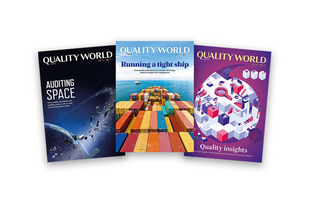
Quality and consumer trust in the age of fake news

Triaster’s Brad Fagan explains why a culture of quality is critical as businesses embrace the digital age.
The digital age is a little terrifying for both private users and organisations, partly because quality failures in a digital age rarely go unnoticed. This is why quality professionals are an essential hire.
The benefits of the public knowing that your brand is trustworthy – in an age where few things are – might just be enough to push you to the top of the brand loyalty pile.
A dissatisfied customer is a powerful enemy and if you’ve stored up enough negative currency with enough people, this can become a self-perpetuating nightmare. On the other hand, no company sets out to create ‘customer enemies’.
However, one thoughtless tweet sent out by your corporate marketing department using the hashtag #WhyIStayed could become a real problem. DiGiornio Pizza used this hashtag to promote its pizza without realising that it was associated with domestic violence and immediately ignited a Twitter firestorm.
Fake news
One of the more startling occurrences in recent times, and something that has the possibility of hurting a company’s brand overnight, is the trend of ‘fake news’ occupying the consumer’s social media feed.
It is estimated that 44 per cent of US adults are getting their news from Facebook. This won’t come as a shock to anyone who regularly uses the social media platform.
What may come as a shock, and should worry the business world, is that during the key campaign dates of the US election (February to August 2016), the top 20 fake election news stories had 8.7 million engagements on Facebook compared to the top 20 legitimate election news stories of the same period, which received 7.7 million engagements. This highlights just how powerful fake news has become.
You might be thinking, ‘What does this have to do with business? The US election was a completely different beast altogether.’
The problem is that fake news is becoming big business for those involved with its production, meaning they are now finding new targets and your business could become one of them.
Fake news is already negatively impacting business. Take the tweet about flooding in the New York Stock Exchange. At no time did this happen but that didn’t stop The Weather Channel from tweeting it.
One tweet from Donald Trump was all it took to see Toyota shares drop three per cent, after he threatened high tariffs on their proposed plant in Mexico. It was enough to convince Ford to scrap plans on their own Mexico plant.
The best thing a company can do is to focus on quality from the start and build up a solid and loyal fan base of followers who are just as willing to defend your business as you are.
The answer is to have a barrier on top of the cliff instead of an ambulance at the bottom. After all, it’s a lot harder to turn negative energy into positive than it is to operate in the positive column and stay there.
Listen to the consumer
So here’s a golden tip for companies wanting to have a great reputation: listen to the consumer. Not just the consumers you already have, but the ones you hope to attract in the future.
Use social media as a tool for improvement. Listen to customer complaints about other companies that won’t listen and get out in front of them.
Today’s consumer has become more discerning, more opinionated and more marketing savvy but this doesn’t have to terrify you as a business professional. It should present you with an opportunity to fix what is not yet broken for existing and potential customers.
In the end, the return on investment from a quality focus comes from creating loyal consumers who readily spread the facts about your products.
Also, in an age where misinformation is on the rise, trust is becoming even more of an important commodity to the consumer economy than ever before.
Member only

This article is free to access for a limited time only. Only CQI and IRCA members receive access to all content.